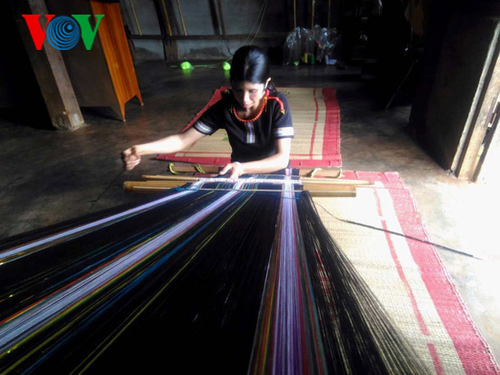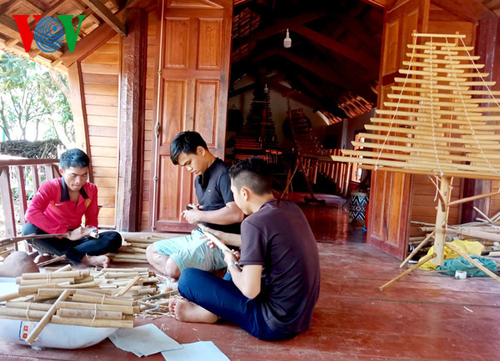 A Mnong ethnic girl learns brocade weaving at St. Teresa Hostel. A Mnong ethnic girl learns brocade weaving at St. Teresa Hostel. |
After 5 years engaged in brocade weaving in St. Teresa Hostel, H’Juel H’Long has been asked to stay to teacher younger members in the house.
Every afternoon between 8 and 10 girls aged from 10 to 16 gather by looms. Some practice spinning fibers; others try to design patterns.
H’Juel H’Long observes each class member and meticulously instructs them to conduct every step exactly so that they can turn out the best products.
H’Juel said it is not only a work which brings in joy and income, but more importantly inspires other children and conserves traditional crafts.
“After I had studied to weave brocade, the sisters have facilitated me to teach smaller children. It’s easier to learn a craft than to teach others because some of the children find it hard to acquire new knowledge. In these cases, I must be patient to help them correct every detail, show them how to calculate fiber or how to release threads. I feel happy to teach others thus we can keep the group’s traditional craft,” H’Juel recalled.
13-year-old H’Vang of Mnong ethnic group in Dak Nong province is actively studying weaving. In addition to learning at school, in every free afternoon, H’Vang comes to the St. Teresa Hostel to learn from H’Juel.
H’Vang said her paternal grandmother is the only person in the family to know how to weave brocade. But she is very old and weak and has poor eyesight so she rarely uses the loom. H’Vang began to be interested in weaving brocade with original Mnong patterns since she saw the students at the St. Teresa Hostel learn the craft.
“After learning weaving for two weeks, I like it and have asked the sisters to continue. Now I can weave pieces of patterned cloth. I wish when I can weave proficiently, I can either stay at the hostel or open a small shop in the village and teach the craft for village children,” said H’Vang.
The children at the facility also learn to make handicrafts and perform traditional musical instruments.
Every afternoon the hostel’s campus is bustling with many groups doing different things. Girls learn to weave brocade, or embroidery. Boys learn to make musical instruments, fine art articles, or play gongs or a kind of musical instrument.
Every year the hostel organizes talent competitions which require each ethnic group to sing their traditional songs in their mother tongue and play the gongs featuring their groups’ identities.
 Students at the St. Teresa Hostel study how to make traditional musical instruments. Students at the St. Teresa Hostel study how to make traditional musical instruments. |
Sr. Mary Nguyen Thi Thuan, head of the hostel, said this is a way to educate local children to conserve their cultures. The nuns select gifted students in each field and hire tutors to teach and foster their strengths. In addition, the sisters have also found outlets for their products, signed contracts to help the children perform at tourist areas and motivate them to love and keep the trade.
Sr. Thuan said: “They have much talent, especially in music and aesthetics. Each ethnic group has typical identities that should be conserved and developed by the younger generation. We want the children to love and feel proud of their cultural heritages and learn from elder artisans. By that way, they will develop.”
Established in 2003, the St. Teresa Hostel has nurtured and supported more than 200 students. Many of them graduate from colleges and universities and work in hospitals and schools and for foreign companies.
Currently the hostel is bringing up 20 children from the first to the 12th grades of 14 ethnic groups in remote villages in Dak Lak and Dak Nong province.